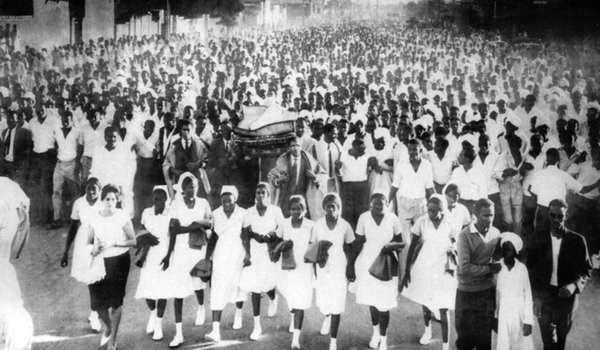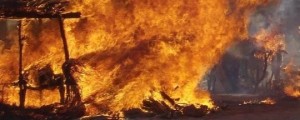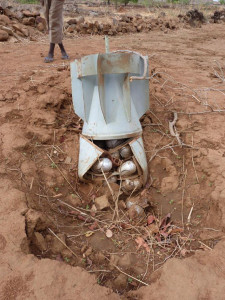This is the eighth installment of a digest containing what I believe to be the most important stories reported by Radio Dabanga in the previous week. Radio Dabanga has been by far our most important and reliable source of information about what is occurring in Darfur, and provides a great deal more than the UN/African Union Mission in Darfur (UNAMID), the UN Office for the Coordination of Humanitarian Affairs (OCHA), and the largely worthless quarterly reports of the UN Secretary-General.
This digest looks at a range of stories revealing of the dangers confronting Darfur. Leading up to and following Sudan’s pathetic electoral travesty, referred to absurdly by the National Congress Party regime as “elections,” a considerable amount of news has been reported by both Radio Dabanga and Sudan Tribune. I have limited myself to the usual ten primary stories, but there are several related stories that are important in their own right and have been included in subsidiary positions (primarily in relation to the last story, concerning Sudan’s “elections” and how they pertain to Darfur). This is still perforce highly selective.
All dispatches have been edited to some degree for length; any editorial comments on my part appear italicized in [brackets] and in blue; all emphases within the cited texts have been added. The reporting on the election appears at the end of this digest.
Eric Reeves, 19 April 2015
Darfur: Radio Dabanga Digest, Number 1 | http://wp.me/p45rOG-1CD
Darfur: Radio Dabanga Digest, Number 2 | http://wp.me/p45rOG-1De
Darfur: Radio Dabanga Digest, Number 3 | http://wp.me/p45rOG-1Dt
Darfur: Radio Dabanga Digest, Number 4 | http://wp.me/p45rOG-1Ei
Darfur: Radio Dabanga Digest, Number 5 | http://wp.me/p45rOG-1EL
Darfur: Radio Dabanga Digest, Number 6 | http://wp.me/p45rOG-1Fp
Darfur: Radio Dabanga Digest, Number 7 | http://wp.me/p45rOG-1FL
Darfur: Radio Dabanga Digest, Number 8 | http://wp.me/s45rOG-6452—and below
• Sudanese civil society call for nation-wide intifada
April 12, 2015 | Khartoum
The Civil Society Initiative stressed that the road chosen by the Sudan Appeal signatories, after the Sudanese government declined to accept the AU invitation to discuss the process of a broad national dialogue in the Ethiopian capital on 29 March, is a mass intifada. It called “on all sectors in the rural and urban areas” to support the Sudan Appeal and the uprising. “Only a nation-wide uprising can release Sudan from the grip of the corrupt ruling National Congress Party, restore peace, rights and freedoms, and rebuild the country based on democracy and equal citizenship,” the statement reads.
[Over the past three years there has been growing civil discontent and restiveness. This is hardly surprising given the dismal condition, indeed slow death of the economy; of particular concern are for ordinary Sudanese is the very high rate of inflation, especially for food and cooking fuel. The absence of sufficient foreign exchange currency (Forex) has left the regime unable to purchase in timely ways the wheat imports necessary for the bread that is a staple food for many northern Sudanese. And because the regime has over the course of its twenty-five years of tyranny run the agricultural sector into the ground, there is no near-term solution to this most basic of problems. As a consequence, civil society organizations, and organization, have strengthened so significantly in the past year in particular that we may be sure they will continue. Only the bloody use of violence by the security forces keeps the regime in power, and even this will eventually not be enough.]
Civil society uprising in Sudan (1964) helped to remove one tyrant from power
• North Darfur butcher shot by militiamen, one dead
April 17, 2015 | Kabkabiya
Two merchants were shot, resulting in the death of one of them, in a market south of Kabkabiya, North Darfur, on Thursday. A witness said that pro-government militiamen had bought meat from the weekly butchers’ market of Kala, but refused to pay butcher Mohamed Sulaiman Isa the full amount. “When Isa asked them to pay the money, they refused, and opened fire on him.” [That this should be so typical in Darfur—so often repeated in one form or another in transactions between businesses and Khartoum’s militia forces, acting with total impunity—contributes to the particularly bad economic situation even in those areas of Darfur where it makes sense to speak of “an economy.” The long-term effects on relations between Arabs and Africans/non-Arabs will play out in marketplaces for years to come, to the detriment of all.]
• Armed robbers attack North Darfur camp market
April 15, 2015 | Kabkabiya, North Darfur
A group of gunmen attacked the market of El Salam camp for the displaced, east of Kabkabiya, on Monday. One of the victims told Radio Dabanga that armed men on motorcycles stormed the camp market, and beat and whipped the merchants before robbing their stores. “The Janjaweed also robbed a number of customers.” He added that they intercepted an Atos commercial vehicle that was passing by, and robbed the passengers of their money and mobile phones at gunpoint. “They also opened fire at another vehicle. Its driver miraculously survived the attack. The car was severely damaged by the bullets.” [The vulnerability of camps for displaced persons and virtually all roads is simply shocking: if we need any evidence of the gross failure of UNAMID to fulfill its primary mandate of civilian protection, it lies in the extreme vulnerability of the camps, where security continues to deteriorate rapidly.]
• Relief agencies continue to assist newly displaced in Darfur
April 19, 2015 | Khartoum
Aid agencies continue to register and provide assistance to the tens of thousands of people who fled the violence in North Darfur’s Tawila locality and the area of Jebel Marra area. Organisations have so far assessed and verified the needs of 31,800 newly displaced, who sought refuge in North, Central, and South Darfur the UN Office for the Coordination of Humanitarian Affairs (OCHA) in Sudan reported in its latest weekly bulletin. Humanitarian interventions have been limited to areas where aid organisations are able to access the affected, while a significant number of newly displaced, particularly in Jebel Marra, are not accessible, because of the insecurity and access restrictions imposed by local authorities in the area.
[What goes insufficiently remarked in nearly all discussions of humanitarian relief in Darfur is that Khartoum contributes virtually nothing materially; indeed, the Humanitarian Affairs Commission is the regime’s instrument for obstructing, harassing, and limiting international relief efforts. But the country that can buy highly advanced MiG-29 fighter aircraft by the dozen can’t find the money to contribute to relief efforts in Darfur. Confident that the international community will do whatever is needed—or rather, whatever the regime will permit—Khartoum has put military priorities over civilian welfare in countless ways, and not just in Darfur. Eastern Sudan is another region that is denied humanitarian relief (a number of international humanitarian organizations were expelled in summer 2012, including Save the Children/Sweden, Ireland’s GOAL as well as another Irish NGO, and a Japanese NGO. The excuse given was that the organizations had “failed in their planned projects.” Since Eastern Sudan (Red Sea, Gedaraf and Kassala states) has long had some of the worst malnutrition rates in Sudan, especially for children, this explanation makes absolutely no sense. Predictably, there was no meaningful international reaction to a decision that undoubtedly cost thousands of lives, especially young lives.]
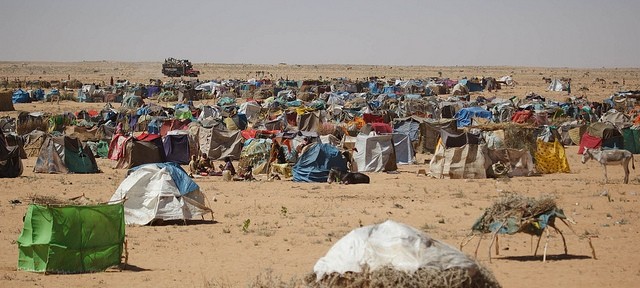 The grim existence of the displaced in Darfur; all meaningful relief aid comes from international organizations, not the Khartoum regime
The grim existence of the displaced in Darfur; all meaningful relief aid comes from international organizations, not the Khartoum regime
• Mine collapses: 82 dead in North Darfur
April 17, 2015 | Jebel ‘Amer
82 miners were killed in Jebel ‘Amer in El Sareif Beni Hussein locality, North Darfur, on Tuesday. One of the wells collapsed in one of the tunnels. A relative of one of the dead miners told Radio Dabanga that people have recovered 35 of the 82 miners, who registered their names before going down the excavation pit. 47 are reportedly still under the rubble of the collapsed well. The relative said that they were not yet able to identify the dead who have been recovered. [In its haste to accumulate gold as a source of foreign exchange, Khartoum has been ruthless and utterly expedient in developing the gold mines in the Jebel ‘Amer area. Mine safety is the very least of their concerns, and these dead will be joined by many more because of Khartoum’s rapacious extraction efforts.] In April 2013, a mine in Jebel ‘Amer also collapsed. More than 60 miners were killed.
• Woman raped in Darfur’s East Jebel Marra
April 13, 2015 | Eastern Jebel Marra
Two militiamen raped a 21-year-old woman from Fallujah village in East Jebel Marra on Sunday. She was on her way to collect firewood near the village, when two gunmen riding on camels intercepted her, a relative of the victim told Radio Dabanga. “These Janjaweed, wearing military uniforms, raped her alternately at gunpoint,” he said. [The reality of rape as a weapon of war continues unabated in Darfur. All the world knows this and yet it never figures as a primary topic in discussions of the regime’s behavior, despite the incalculable destructiveness of a campaign that has seen many tens of thousands of girls and women raped over the past twelve years. The refusal—by UNAMID, by the UN Secretary-General, and by the international community as a whole—to end the complete impunity of the perpetrators of these brutal crimes is ultimately a denial of its significance. It is one the most shocking features of the response to Darfur’s expanding catastrophe.]
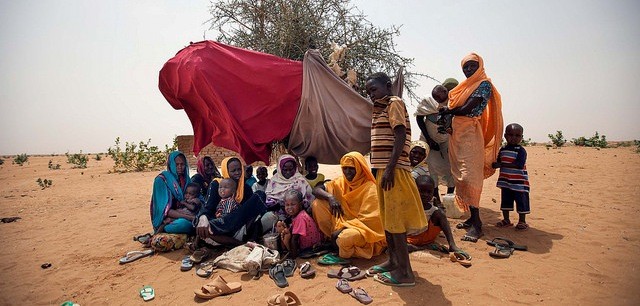 Women and children in Darfur: their vulnerability is impossible to overstate
Women and children in Darfur: their vulnerability is impossible to overstate
• Nearly 260,000 Sudanese refugees flee to South Sudan
Sudan Tribune: April 16, 2015 | Juba
South Sudan currently hosts close to 260,000 Sudanese refugees despite the country’s ongoing conflict in which millions of its own citizens have been displaced, the United Nations said. According to the UN Office for the Coordination of Humanitarian Affairs (OCHA), most of the refugees live in six camps in Unity and Upper Nile states. “Many of them [refugees] are from South Kordofan in Sudan, and recent months have seen an increase in the number of new arrivals from this area,” OCHA said in a report. Since 23 December 2014, some 9,800 Sudanese refugees from South Kordofan have reportedly been transported to Ajuong Thok camp from Yida border town, with the majority said to be new arrivals fleeing ongoing conflict and insecurity in the Nuba Mountains. “The remainders are long time residents of Yida, originally a spontaneous settlement sheltering nearly 70,000 refugees,” the report said.
The UN agency said the new arrivals from South Kordofan were stretching existing camp infrastructure, creating gaps in essential services like sanitation, health and education. Schools have as many as 140 students per classroom. [A number of Darfuris are refugees in South Sudan, but we have no accurate census of this population; see | http://endgenocide.org/twice-displaced-young-woman-from-darfur-in-a-nuba-refugee-camp/)
• Militiamen threaten to torch West Darfur camp
April 17, 2015 | Kereinik, West Darfur
Pro-government militiamen have threatened to burn down a camp for internally displaced people in West Darfur, unless the residents compensate for the injuries two of their comrades sustained on Wednesday. On Thursday, the militiamen made their demand for an unspecified amount of money to the displaced community of Sese camp in Kereinik locality. One of the displaced told Radio Dabanga that after the police and the sheikhs in the camp concluded that SDG 4,000 ($668) was to be paid to the militia, which the displaced people did, the men demanded more money and threatened to otherwise torch the camp. “The situation is tense, as the militia members are still stationed next to the camp,” the camp resident explained.
The incident that preceded the threats related to the rape of one displaced woman on Wednesday morning by militiamen. Two women went out on Wednesday morning to collect straw near the camp when four militiamen on camels intercepted the way. One of the women ran to the camp to report it. A group of camp residents arrived to the scene to discover that the other woman had been raped. They got into a fight with the men, which resulted in the stabbing of two militia members.
“That same evening, the militiamen gathered to attack the camp, and burned two houses,” the source said. Members of the militia returned the next morning to demand a compensation for the injuring of two of their personnel and threatened to otherwise burn down the camp. When consulted, the local police and the camp sheikhs came with the solution in which they committed the displaced community to pay SDG 4,000. The militiamen retreated after receiving the money, but continued to express their threats. [These extortion schemes, directed at the completely vulnerable populations of the camps for displaced persons, are proliferating rapidly. UNAMID does nothing to forestall or respond to them. And once the extortionists see that they can demand money and it will of necessity be paid, they will demand more. This is a vicious circle that will only become more vicious in the coming months, especially during the rainy season beginning in June.]
Fire in the camps for displaced persons is a constant danger; arson is responsible for many of these fires.
• Sudanese Air Force bombs Fanga in East Jebel Marra
April 16, 2015 | Eastern Jebel Marra
The area of Fanga in East Jebel Marra was subjected to aerial bombardments on Wednesday. Speaking to Radio Dabanga, a resident of Fanga said that an Antonov of the Sudanese Air Force bombed the area on the third day of the election. “A number of camels, donkeys, and goats were killed. No human casualties were reported.”
[Indiscriminate aerial bombardment of civilian targets—a staple feature of the National Islamic Front/National Congress Party regime for more than a quarter of a century—shows no signs of abating, either in Darfur or in South Kordofan and Blue Nile. Like rape used as a weapon of war, the aerial targeting of civilians and civilian sites is an atrocity crime—in aggregate, constituting crimes against humanity. And yet as with rape, the international community can’t find its voice, can’t bring sufficient pressure on Khartoum to halt these barbaric “counter-insurgency” measures. How can debt relief for the regime, discussed in Washington this past week as Khartoum’s Finance Minister made an appearance, be a topic while these crimes continue? Why has the issue of debt relief for Khartoum been mooted by various officials from The Netherlands, Germany, France, the UK? The answer can only be ignorance of an unforgivable nature, or a supreme callousness.]
• Two killed by bomb explosion in Darfur’s Jebel Marra
April 10, 2015 | Fanga
One child and one 23-year-old died in a bomb explosion south of Fanga, East Jebel Marra, on Thursday. A relative of the victims told Radio Dabanga that Bishara Abdelrahman Adam (14 years) and Mariam Saleh Omar (23 years) were riding on donkeys on their way to a garden, 3 km south of Fanga. Their movement triggered an unexploded grenade to detonate. Both Bishara and Mariam died on the spot, along with their donkeys. The relative explained that parts of their bodies were scattered. They were collected and buried on the same day. [Unexploded ordnance (UXO) continues to be a major problem wherever Khartoum directs its aerial attacks; there is no quality control for the bombs loaded onto military aircraft, or concern about the effects of possible UXO. Wildly indiscriminate “cluster bombs” in the Nuba Mountains, use of which was recently reported by Human Rights Watch, is for this regime the perfect weapon.]
A partially detonated “cluster bomb” in the Nuba Mountains; Human Rights Watch has recently reported on the use of these most indiscriminate aerial munitions in the Nuba
• REPORTS RELATED TO DARFUR DURING SUDAN’S (NON)ELECTION
Two injured, 12 detained in North Darfur anti-election protest
April 14, 2015 | El Fasher
Two students of El Fasher University were injured and at least 12 others were detained today, during an anti-election demonstration in the North Darfur capital. Hundreds of El Fasher University students gathered this (Tuesday) morning at the College of Education, one of the demonstrators told Radio Dabanga. “We marched via the Faculties of Natural Resources and Science to the Faculty of Medicine, protesting against the election, the continuing air raids, the killing and raping, and the displacement of tens of thousands in the Darfur, the Blue Nile and the Nuba Mountains [in South Kordofan].
“When we reached the university’s main gate, on our way to the city centre, a force made up of security agents, policemen, and militant students of the National Congress Party in four lorries and three Land cruisers attacked us with batons, tear gas, and live bullets. Two women students were wounded, and at least 12 were taken to unknown destinations.”
“Paramilitary forces cast their vote more than once in North Darfur’
April 16, 2015 | Saraf Umra Locality, North Darfur
Militiamen reportedly voted much more than once in Saraf Umra. The ballot boxes at the Aradeiba polling centre in Saraf Umra locality were stolen today. Government-backed militiamen are threatening to kill people in Birkat Seira and surroundings, if they do not vote for incumbent President Al Bashir and the local candidate of the ruling National Congress Party (NCP). Multiple sources told Radio Dabanga from Saraf Umra that members of the paramilitary Border Guards and other militiamen cast their vote more than 50 times each in the polling centres in the town, in order to raise the ballots number. “They even took children with them to vote.”
Militiamen riding a Land Cruiser mounted with a Dushka machinegun raided the polling centre of Aradeiba this (Thursday) afternoon. “They threatened the polling workers at gunpoint, loaded all ballot boxes on their vehicle, and left,” an eyewitness reported to Radio Dabanga. “The staff did not sustain any injuries.” The people living in the area of Birkat Seira and along Wadi Barei have been ordered by members of the paramilitary Border Guards and other militiamen to go to the polling centres and cast their vote on President Omar Al Bashir and the Saraf Umra NCP candidate for the parliamentary election, Mohamed Ismail, nicknamed El Muhajer. “They threatened to kill us, if we would not comply,” a resident of Birkat Seira told Radio Dabanga.
North Darfur villagers threatened if they do not vote for NCP
April 16, 2015 | Birkat Seira
Members of the ruling National Congress Party (NCP) in Saraf Umra locality have threatened to attack villages in the area of Birkat Seira, if the people do not vote for the locality’s NCP candidate. “NCP candidate Mohamed Ismail, nicknamed El Muhajer, instructed the villagers of Birkat Seira to vote for him,” the coordinator of the Saraf Umra camps for the displaced reported to Radio Dabanga. He said that the sheikhs of Melisa, Numeira, Ahmed, Ahmed Logli, and Kurkul villages were pressured by “El Muhajer,” supported by elements of the paramilitary Rapid Support Forces, and militiamen affiliated with former Janjaweed leader Musa Hilal, to convince the people to vote for him.
“The village elders were told that their lands would be occupied, if they would not cooperate. They now began pressuring the villagers.” The coordinator said that the people should not succumb to such threats, “as these militias will attack them anyhow, whether they cast their vote or not.”
Five polling centres closed in Central Darfur’s Garsila
April 15, 2015 | formerly West Darfur
The National Election Commission (NEC) has announced the closure of five of the 16 polling centres in Garsila, capital of Wadi Salih locality, because of a delay in the arrival of voting materials. NEC spokesman El Hadi Mohammed Ahmed said that 160 out of 7,000 polling centres distributed over 18 states witnessed logistical problems on Monday, the first voting day…. The voting process was postponed too in the insecure border areas of El Dibab in West Kordofan and northern Abyei. The second voting day again witnessed a poor turnout, amid a countrywide boycott of the election.
“Students beaten and humiliated in prison”: lawyers, North Darfur
April 17, 2015 | El Fasher
The eighteen students of the University of El Fasher who were arrested during their anti-election protests this week were subjected to torture, according to their lawyers. One of them is a minor. Three other university students were detained in East Jebel Marra. One of their lawyers told Radio Dabanga on Friday that the students were transferred from the cells at the national security service’s office to Shala prison and the police station east of El Fasher, the capital of North Darfur. “They are in bad psychological conditions, and subjected to torture and cruel treatment,” they claimed, after visiting the detainees in Shala prison yesterday. “We’ve seen signs of torture and beatings on the students […] The eighteen students face criminal charges which are punishable by death, namely undermining the constitutional order, rioting, and sabotage, after they joined protests against the election in Sudan. [Darfuri students have been the particular targets of many of the security operations in Sudan over the few past years.]
African Union confirms low turnout in Sudan’s election
Sudan Tribune: April 16, 2015 | Khartoum
The head of the African Union observation mission for the Sudanese general election has confessed the weak participation of the Sudanese voters and estimate that (…) However presidential assistant and NCP vice president Ibrahim Ghandour told reporters they are satisfied with the election turnout, adding they are not part in the NEC’s decision to extend the vote period. “I can assure you that we are quite satisfied with the turnout of (election),” Ghandour said in a press briefing for foreign reporters at the premises of the ruling party on Thursday evening.
[And for once we can take Ghandour at his word for this assertion.]
African civil society raise concern over AU monitoring of Sudan election
April 15, 2015 | Cairo, Egypt
A group of 25 African and Sudanese civil society organisations have sent a letter to the AU Commission and the AU High-level Implementation Panel (AUHIP) for Sudan, expressing their “deep concern” about the decision by the AU Peace and Security Council (AUPSC) to send a an electoral observation mission to Sudan. The organisations* state that the AUPSC decision last week to send a mission, headed by former Nigerian President Olusegun Obasanjo, to monitor the 13-15 April presidential and parliamentary election in Sudan, directly contradicts the recommendations of the AU’s own pre-election assessment panel.
[This is but one more indication of the growing tension between African civil society and human rights organizations and the increasingly despotic African Union Peace and Security Council. In the view of many, the African Union is now little better than its corrupt predecessor, the Organizations of African Unity—little more than an “old boys” club of dictators.]
Last month, an AU evaluation panel, tasked with assessing the pre-election environment, said in its report that “the necessary conditions and environment for the holding of transparent, competitive, free and fair elections, as agreed in the AU Principles Governing Democratic Election, have not been satisfied. “The prevailing situation in the country and the negative impact these elections would have on the national dialogue process [..], it is the considered view of the assessment team that deploying an AU Elections Observation Mission under this circumstance would not be viable and effective.”
The 25 organisations point to the “continued intransigence on the part of the Government of Sudan, and its refusal to participate in a pre-dialogue preparatory meeting convened by the AUHIP in late-March, [which] has resulted in the failure of its own ostensible desire to hold a National Dialogue.”
In the letter, they call on Dr Nkosazana Dlamini Zuma, head of the AU Commission, and AUHIP chairman Thabo Mbeki, “to ensure that the AU does not legitimise a process aimed at prolonging the Government of Sudan’s continued political, human rights, and humanitarian abuses and which is grossly inconsistent with the standards of the African Charter on Democracy, Elections and Governance, and exacerbates the root causes of Sudan’s problems, and undermines all progress over the past year to bring about a comprehensive negotiated settlement to the country’s multiple crises. While we do not endorse the decision to deploy the mission, it must report objectively and accurately on structural flaws in the election process.”
* The letter to the AU is coordinated by the Arab Coalition for Sudan in Cairo, Egypt, and undersigned by the Africa Friends Association – Tunisia: African Centre for Justice and Peace Studies – Uganda; ElKhatim Adlan Centre for Enlightenment – Sudan; Arab Programme for Human Rights Activists – Egypt; Arab Coalition for Sudan; Arab Network for Human Rights Information – Egypt; Arab Organisation for Human Rights – Libya; Arab Organisation for Human Rights – Mauritania; Arab Institute for Democracy – Tunisia; Algeria League for Defense of Human Rights – Algeria; Civil Society Initiative – Sudan; Conscience International – Sierra Leone; Darfur Bar Association – Sudan; Governance Bureau – Sudan; Human Rights Development Organisation – Sudan; International Refugee Rights Initiative – Uganda; Journalists for Human Rights – Sudan; Kamma Organisation for Development Initiatives – Sudan; Lawyers for Human Rights – South Africa; Nuba Relief Rehabilitation and Development Organisation – Sudan; Regional Centre for the Development of Civil Society – Sudan; SOS Exclusion – Cote d’Ivoire; Sudan Consortium; Sudan Democracy First Group – Sudan, and Zarga Organisation for Rural Development – Sudan.
*******************************
“The victims [of the Holocaust] perished not only because of the killers, but also because of the apathy of the bystanders. What astonished us after the torment, after the tempest, was not that so many killers killed so many victims, but that so few cared about us at all.”
[Elie Wiesel, “Why were there so few?”]
